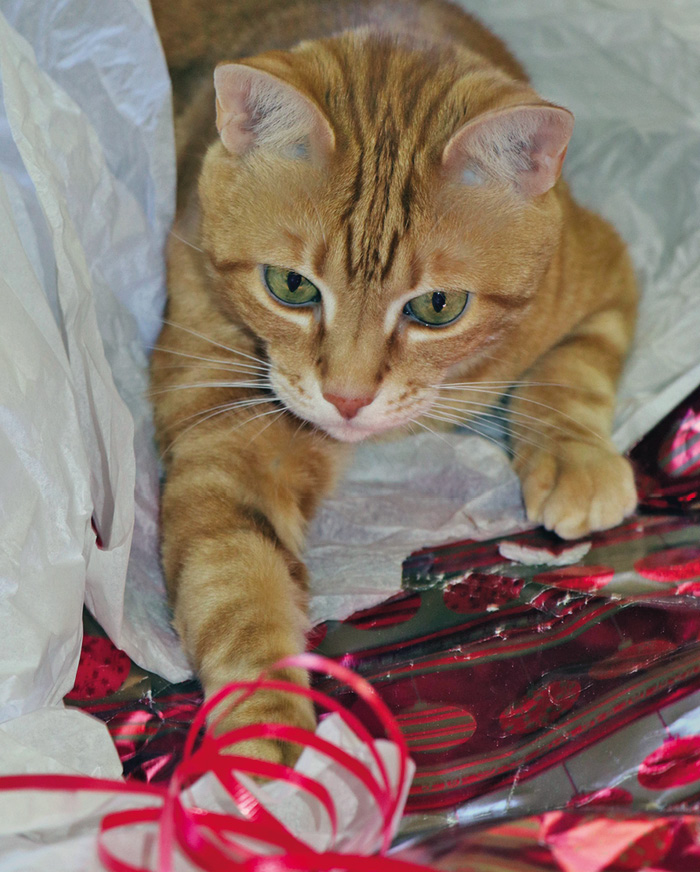We all want our cats to live the happies and healthiest lives possible. Part of this means we need to be aware of household hazards that can get our kitties into trouble, and there are a lot of them.
During the holidays, all kinds of new foods, plants, and decorations that attract feline interest are brought into the house. You’ll need to be on your toes. Gift wrapping presents a cat with an especially irresistible challenge: Wait till the person turns around to get a gift tag, then grab some ribbon and run as fast as you can!
In addition to ribbons, the hustle and bustle of the holidays brings some added dangers for our kitties, including chocolate, candles with open flames, and sweets that might contain the artificial sweetener xylitol.
Poisonous Plants
Many common houseplants are toxic to cats. Effects can range from mild vomiting to kidney failure and death depending on the plant.
Most cat lovers know that lilies and poinsettias are toxic to cats, but there are many other toxic plant species that may arrive in a holiday flower arrangement, including mistletoe, holly, amaryllis, baby’s breath, carnations, geraniums, mint, and tulips.
Keeping toxic plants out of your cat’s reach can be challenging. High places and windowsills sometimes work, but not if a cat is determined. The best way to prevent your cat from chewing on a toxic plant is to keep it in a room that your cat does not have access to.
Household Maintenance Products
Holidays and cleaning go hand-in-hand in most households. Cats are less likely to intentionally consume many cleaning products and other substances than dogs, but they do have a knack for walking through spills. Your cat can then ingest anything that she stepped into as she grooms herself.
While there are plenty of worrisome products out there, be especially careful with antifreeze, bleach, cleaning products, moth balls, rodenticides, and toilet-bowl cleaners. Store all products in areas that your cat cannot access, and clean up spills immediately.
Kitchen Nightmares
Of course, the holidays are a prime time for new dishes and treats. Watch out for grapes, raisins, coffee grounds, tea, cooked/baked bones, and avocados. The safest thing for you to do is to ensure that your cat does not have access to any human foods. We know it’s the holidays, so if you share a little meat as a special treat, remove it from the bone first, and avoid giving large amounts of fat to your cat or overfeeding her in general.
The aroma of your cooking may lure your cat onto a hot stovetop, resulting in burns to her paw pads and nose. A particularly curious cat could also get burned trying to taste-test from an unattended pan.
Ideally, you should teach your cat that she is not allowed on the kitchen counter by immediately picking her up and moving her. Try to prevent her from accessing it at all when you can’t supervise by closing a door or setting up barriers to block the counter. Make sure that food is always put away after meals so that your cat isn’t tempted up onto the counter to sneak a snack. Keeping her off of the counter will also prevent her from contaminating your food with organisms that can cause zoonotic disease, including toxoplasma and salmonella.
If your cat does have kitchen privileges, always keep an eye on her as you cook, and don’t leave hot pans or stovetops unattended. She will definitely leap first and ask questions later.
Personal Items
Cats love to play with tiny items and string-like objects. Some of their stolen “treasures” also pose a choking hazard or can cause a gastrointestinal obstruction. Be especially careful to keep the cat away from dental floss, hair ties, Christmas tree tinsel, rubber bands, ribbons, bows, string, tacks, and twist ties.
Many essential oils are toxic to cats if they are ingested, inhaled, or absorbed through the skin. Check lotions, diffusers, and other personal products for essential oils that may harm your cat and store or discard them accordingly.
Other Dangers
Walk through your house and consider other ways that your cat might accidentally hurt herself or get into something she shouldn’t. Don’t stack gifts and expect her to not check out the new high perch. If the gifts are stacked, they need to be stable.
Also think about hidey-holes where your cat might like to hide, such as the washing machine or dryer. Try not to leave these appliances open, and always check to make sure that your cat isn’t inside before starting a cycle.
Remember that many medications that are safe for humans and/or dogs are extremely dangerous for cats. Top culprits include: acetaminophen (Tylenol), antidepressants, ibuprofen and other pain relievers, permethrins (often found in dog flea and tick medications), and even some vitamins. If you think your cat may have swallowed a pill or come into contact with your dog’s topical flea preventive, call a poison control service immediately. Having the medication vial/container available during this call is ideal.
While it may seem like there are a lot of household hazards out there, almost all of them are easy to avoid with a periodic check of things.
The ASPCA Animal Poison Control Center has an extensive list of plants, foods, and other household items that are toxic to cats. You can find their website at aspca.org/pet-care/animal-poison-control.




